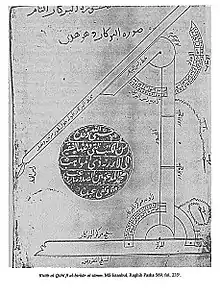Shams al-Din al-Samarqandi
Shams al-Dīn Muḥammad ibn Ashraf al-Ḥusaynī al-Samarqandī (c. 1250 – c. 1310) was a 13th-century astronomer and mathematician from Samarkand.
Life and works
Nothing is known of al-Samarqandi's life except that he composed his most important works in the last two decades of the 7th and early decades of the 8th centuries A.H. He wrote works on theology, logic, philosophy, mathematics and astronomy which have proved important in their own right and also in giving information about the works of other scientists of his period. Al-Samarqandi wrote a work Risala fi adab al-bahth which discussed the method of intellectual investigation of reasoning using dialectic. Such methods of enquiry were much used by the ancient Greeks. He also wrote Synopsis of Astronomy, and produced a star catalogue for the year 1276–77. In mathematics, al-Samarqandi is famous for a short work of only 20 pages which discusses 35 of Euclid's propositions. Although a short work, al-Samarqandi consulted widely the works of other Muslim mathematicians before writing it. For example, he refers to writings by Ibn al-Haytham, Omar Khayyam, al-Jawhari, Nasir al-Din al-Tusi, and Athīr al-Dīn al-Abharī.[1][2][3]
References
- O'Connor, John J.; Robertson, Edmund F., "Shams al-Din ibn Ashraf Al-Samarqandi", MacTutor History of Mathematics archive, University of St Andrews.
- "Samarqandī, Shams al-Dīn Muḥammad Ibn Ashraf al- Ḥusaynī al-". Dictionary of Scientific Biography. New York: Charles Scribner's Sons. 1970–1980. ISBN 978-0-684-10114-9.
- Fazlıoğlu, İhsan (2007). "Samarqandī: Shams al‐Dīn Muḥammad ibn Ashraf al‐Ḥusaynī al‐Samarqandī". In Thomas Hockey; et al. (eds.). The Biographical Encyclopedia of Astronomers. New York: Springer. p. 1008. ISBN 978-0-387-31022-0. (PDF version)
| 2nd/8th |
|
|---|---|
| 3rd/9th | |
| 4th/10th | |
| 5th/11th | |
| 6th/12th | |
| 7th/13th | |
| 8th/14th | |
| 9th/15th | |
| 10th/16th | |
| 11th/17th | |
| 12th/18th | |
| 13th/19th |
|
| 14th/20th |
|
Scholars of other Sunni Islamic schools of jurisprudence
| |
| |||||||||||||||||||||||||||||||||||||||||||||||||||||||||||||||||
| |||||||||||||||||||||||||||||||||||||||||||||||||||||||||||||||||
| Mathematicians |
|  | ||||||||||||||||
|---|---|---|---|---|---|---|---|---|---|---|---|---|---|---|---|---|---|---|
| Mathematical works | ||||||||||||||||||
| Concepts | ||||||||||||||||||
| Centers | ||||||||||||||||||
| Influences | ||||||||||||||||||
| Influenced | ||||||||||||||||||
| |||||||||||||||||||||||||||
| |||||||||||||||||||||||||||
